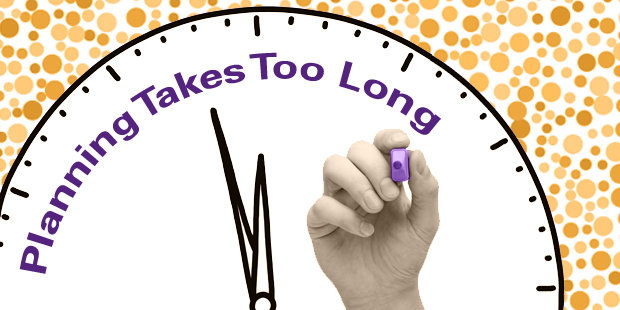
Planning Takes Too Long
“Planning takes too long. Let’s just get started.”
For most of us, the joy of a project is in the result: the finished product. We may even feel too busy to go through the process of creating a clear plan, wanting to ‘hit the ground running’. But how do you know if you’re running in the right direction? When we start coaching a new church to implement a change, we make a plan. Usually this is a pretty detailed plan with lots of tasks, dependent steps, dates … the whole bit. We often get feedback that this planning process takes too long and they just want to get started. But in my mind, planning equals speed. I know that sounds contradictory, but the key is whether you are in a hurry to start, or to finish.
What’s the Hurry?
If you are in a hurry to start a project, then planning is indeed a waste and should be ignored. However, let’s first ask what is driving us to be in a hurry. Here are some common reasons we hear:
- I have to show ____ I am making progress.
- If we have a plan, we will be forced to follow it, and I want to be more flexible.
- I am new here and need to show them I know what I am doing.
- You just can’t plan this type of work.
- I am an action-oriented person. All this talking just wears me out.
None of those hold water in my mind; they are excuses. There is a time, when exploring a brand new thing nobody has ever done, that plans can be fairly vague and loose. In fact, sometimes projects are entering into such an unknown territory that making a meaningful plan can be a waste of your time. However, those cases are the exception, not the rule.
How Does Planning Make Us Faster?
There are four key benefits to a solid plan.
A good plan clarifies direction, scope, and the value of a project before you begin. How many times have you started a project that seemed like a good idea, only to realize halfway through that you can’t even remember why the project was so important? Planning allows you to firm up those reasons and success criteria early. Sometimes creating a plan helps you to realize the project isn’t even worth doing. You just saved yourself and your team a ton of time! The last thing any of us needs in our busy lives is a project we shouldn’t be doing.
A good plan helps us stay focused. This is my favorite reason to make a plan, because I can get so easily distracted. I need tools to help me think only about what is relevant right now. Debating about the color of the carpet in the new sanctuary is not worthwhile when you should be focused on the location of the new building and buying the land.
A good plan helps us to avoid rework. Have you ever heard the phrase “If it’s worth doing, it’s worth doing over again”? While I have always enjoyed that adage, It bothers me that we behave that way so frequently. Think of the time and costs associated with having to go back and redo something — you could have avoided that rework if you had a good plan. A plan should help you do work in the ‘right’ order. Some tasks can be accomplished any time; others have steps that have to be completed first before moving to the next. A planned workflow can help you be efficient and continue to make progress toward your goal. Think of your new church building: pouring the foundation before you have decided where the electrical and plumbing go would be a real mistake. You would have to tear it out and pour more concrete later when you really had a design. In fact, I worked with a church that failed to think about how they were going to run sound and video cables between the stage and the sound booth, so had to tear up concrete in the floor to lay down cables and then come back and repair the floor.
A good plan show us progress. A plan with some milestones in it allows us to track our progress. That progress status is used to do three things that tend to increase motivation, resources, and speed.
- Communicate project status. Sharing with the organization, “We are 30% done on this and we estimate being complete in October” builds clarity and reminds others you are still working and progressing.
- Celebrate your progress. Some steps are more difficult than others, and when you celebrate completing a difficult challenge, it builds morale within our team. “Yahoo — we reached the end of the design phase!” An encouraged team is more motivated to focus on the work.
- Compete for resources. In this world of limited time and resources, we often have to fight to keep the resources we secured at the beginning of the project. Sometimes this can be true in the capital campaign as well. “We still need Bob on our team. Look at all he has done and what other tasks are assigned to him.” Plus this is not only true for human resources but financial commitments as well. At the launch of the project, people committed to give to support it, but if you don’t keep them in the loop on the progress you are making, you run the risk of their getting distracted and putting their money elsewhere.
Be willing to focus on the outcome you want before starting. Think of that project you are hesitating to start. Make a quick plan … just enough to get started. If this is a big project, find yourself some project management software and someone to drive it.












